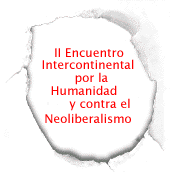31 July Report from Sub-Table 1d (forms of living beyond the market) of the Mesa de Madrid

 The purpose of this text is not to express unanimous or consensual conclusions, but instead to demonstrate the diversity of ideas to leave a record of the themes discussed.
 In reference to the possibility of existing "beyond the market" there were two distinct positions: there were those who thought it possible (or desirable) the creation of self-sufficient "islands" completely outside the market, and those who perceived this to be impossible since in our age capital subsumes everything. A criticism was made of many projects which go under the banner of self-management, but reproduce capitilist mercantile relations. It was also observed that other projects have a dual character where profits are used for alternative social projects (non-profit), that's to say, they are inside and outside at the same time. Value is given to these partial attempts which question capitalist market relations.
The spirit of this sub-table:to investigate and create non-profit projects, but also to change the value-system imposed by the capitalist market (competition,individualism,egotism...)
To tend towards an exodus from the capitalist market it is considered necessary to promote self-sufficiency, avoiding the reproduction of metropolitan patterns,which are the product of industrial development: to tend towards the simplification of technology, question the division of labour,to break with the lie of urban progress, to create villages in the metropolis, new urban identities to break with the model of big cities.
 This last point generates different points of view as to what to do with technology. Some people do not see the possibilities of reusing the current model of social co-operation and tend towards technological simplification (high technology implies hierarchy and other undesirable effects) and the generation of other forms of co-operation. Others propose the way of reappropiation of the potence of social co-operation in function, destroying the capitalist power-structure which strait-jackets this potence, liberating the time in our lives and permitting the proliferation of singularities. A criterion is added regarding this reappropiation, as to the use of technology: to consider it's effect not only on the lives of the people who use it, but also the repercussions in the lives of the producers of technology, of the people who suffer it's consequences and the bio-diversity of the planet. The destruction of certain technological applications (nuclear, military,..) is desirable.
 When we talk about the market, it is useful to make a distinction. Capitalism and the market at the end of this century is not the same as at the end of the 19th century; this helps us to understand the failures of the old Left throughout the 20th century and the emergence of new social movements which question the classical models of organization and forms and strategies of struggle.
THE QUESTION OF NETWORKS
 Attention is drawn to the current form of capitalist power, which is neither centralized nor unified and also corresponds to the paradigm of the network: this obliges a diversification of struggles and forms of oposing it, abandoning definitively the insurrectionalist model or of the taking of power or attempts to export one single model of struggle to all parts of the planet.
 About forms of organization and the proposal of creating networks of struggle: an evaluation of previous models - like single-issue co-ordinating bodies and national/continental platforms and also the Party structure - and the desire was expressed to build new forms of co-operation which don't follow these models and which hope to achieve global co-ordination but flowing from the singularity of each struggle.
 The point was made that these networks should not take the State as a symmetric reference when defining their struggles, but reinforce the autonomy of creative experiences and organizational forms which each locality adopts.
 Power-relations within movements are to be questioned, the presence of "cadres" or people who take on too many responsibilities, which is seen as a weakness of these networks rather a hunger for power in these people.
 A last point about the organization of the 2nd Encuentro: we criticize the exclusion from work-tables of people without accreditation, something which was decided to avoid in this Social Centre. Also the use of the money and the way in which it was proposed to manage expenses: by obliging participants in the Encuentro to pay for everything from the start, the possibilities for self-management of travel, food, etc were limited and the organizers were condemned to a role of providers of services. People then adopt a passive role while placing demands on others. THe centralization of the tables, the excessive burden of responsibility on a few people, and a rather bureaucratic nature of functioning is not the model for horizontal networks that we desire. Self-management is not only a word to put in texts, it's a daily practice which should have been implemented in this Encuentro. This said, we recognise and value the efforts of all the compaņer*s who have made this event possible.